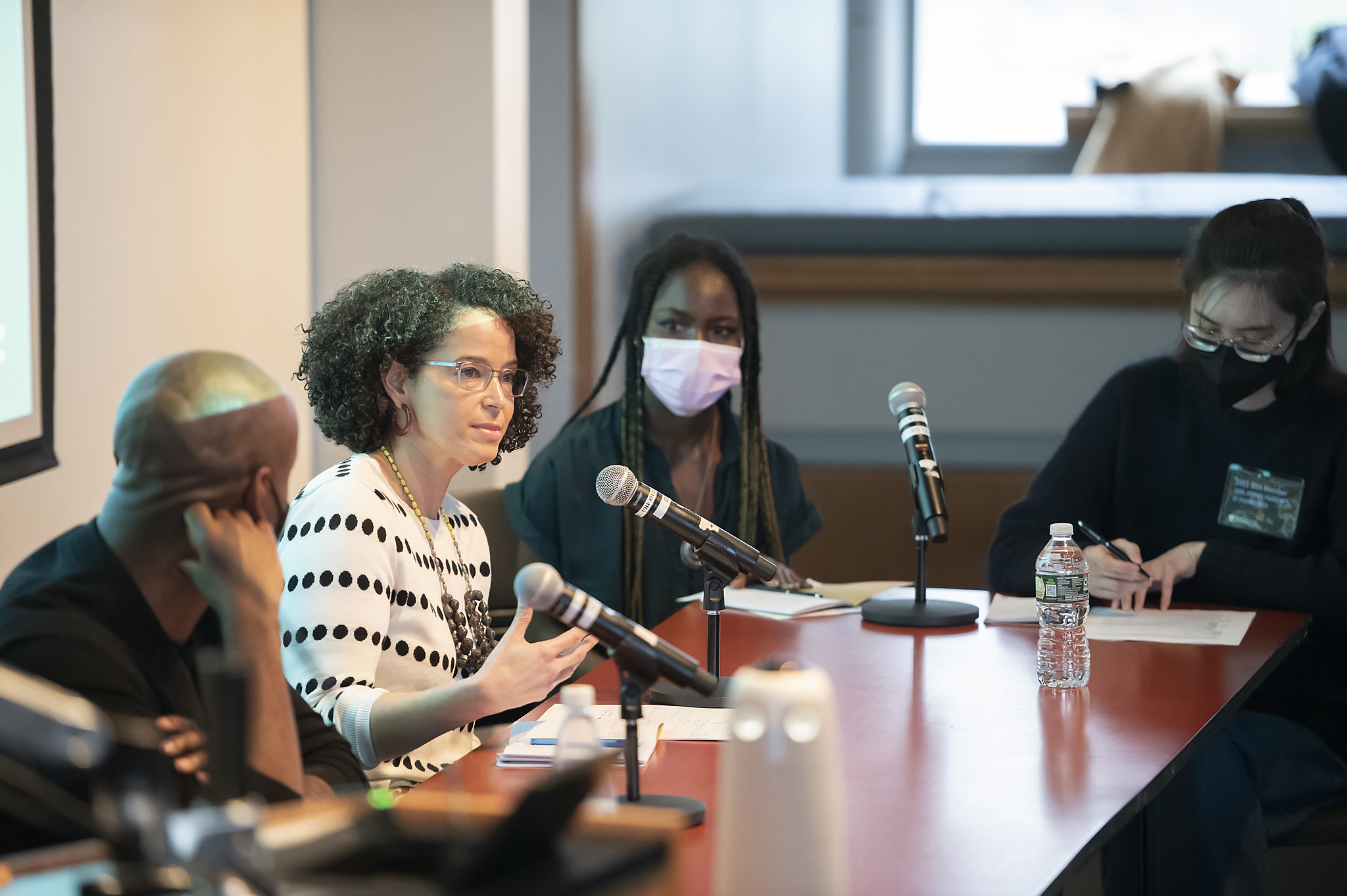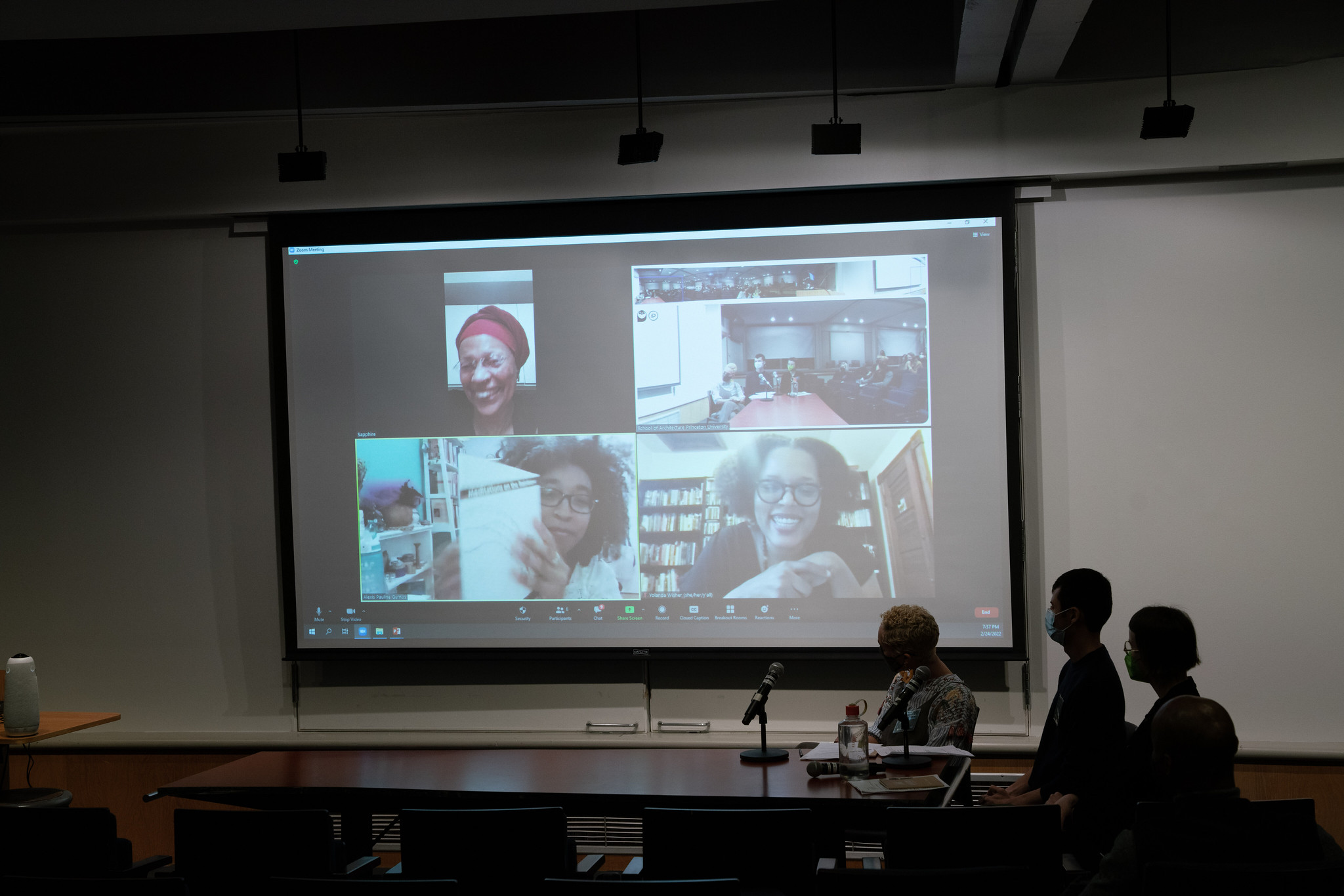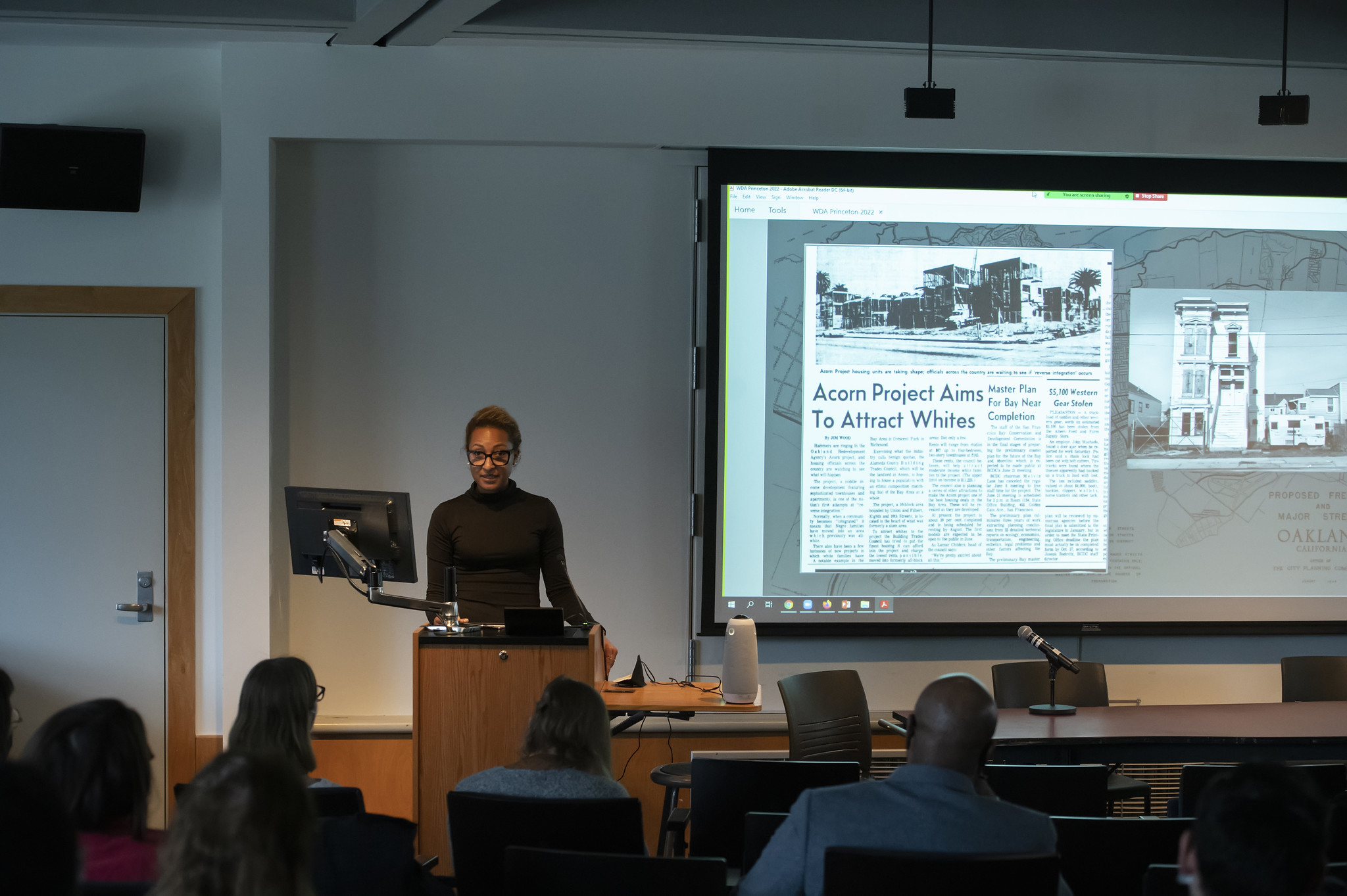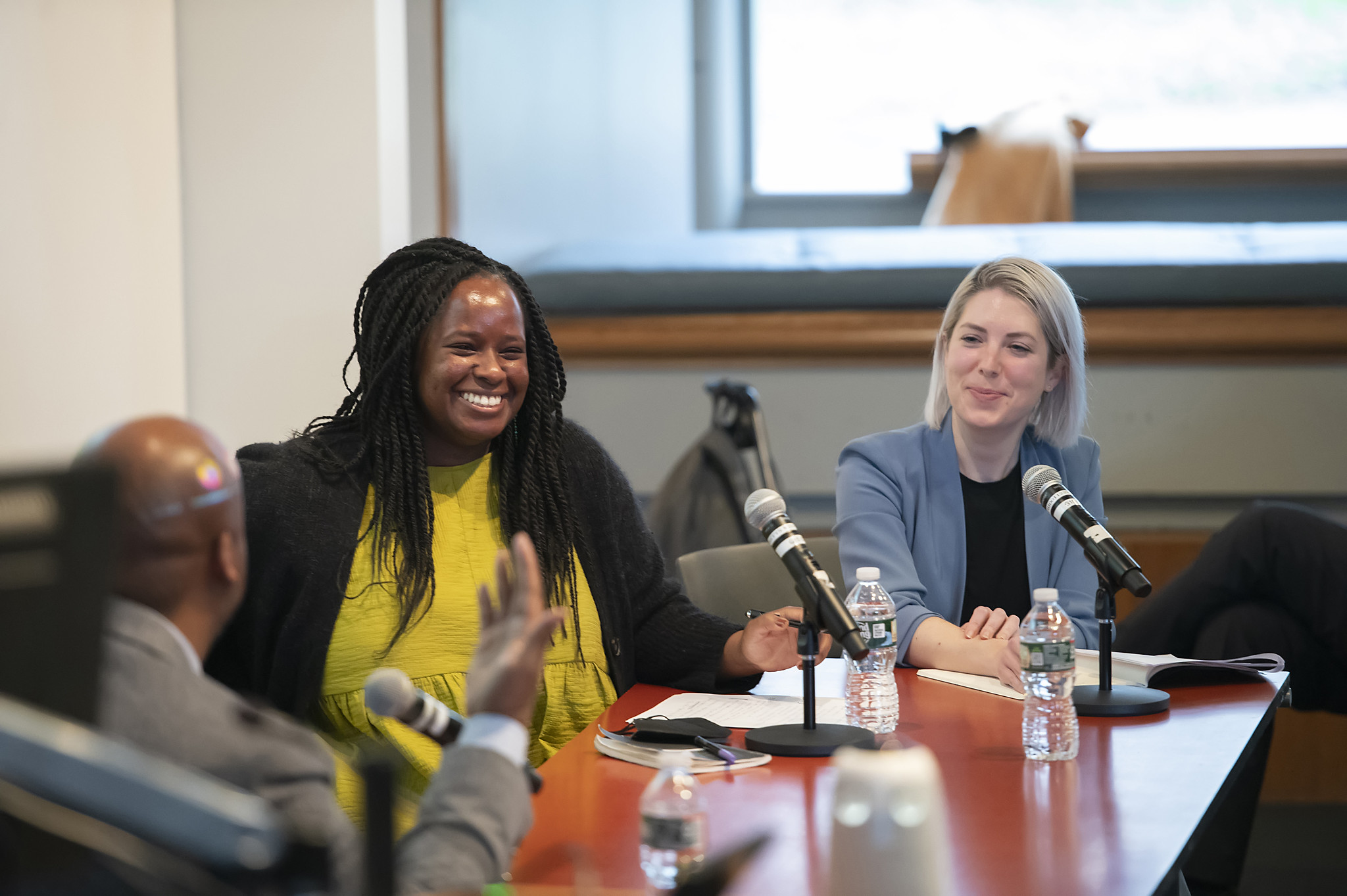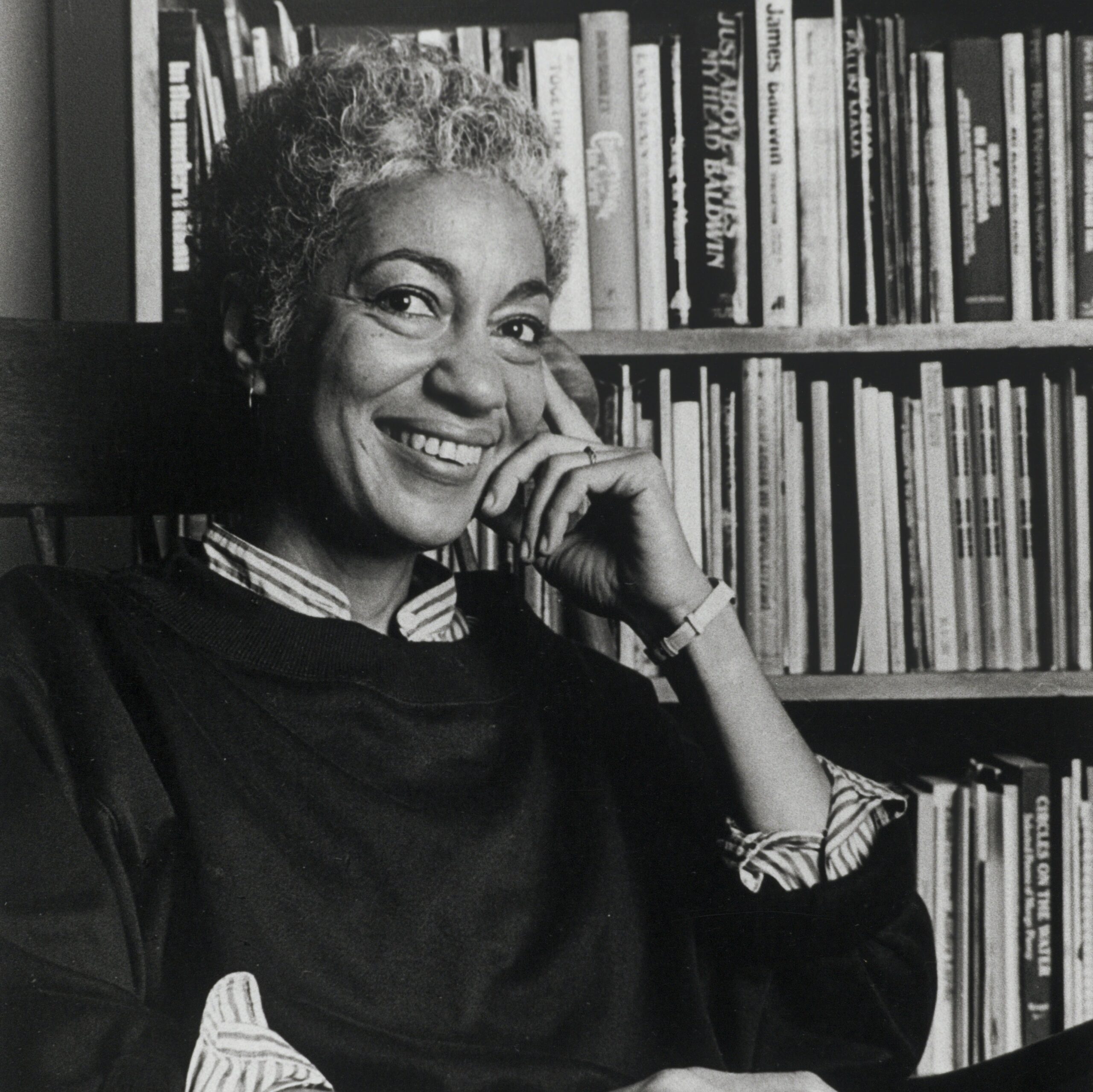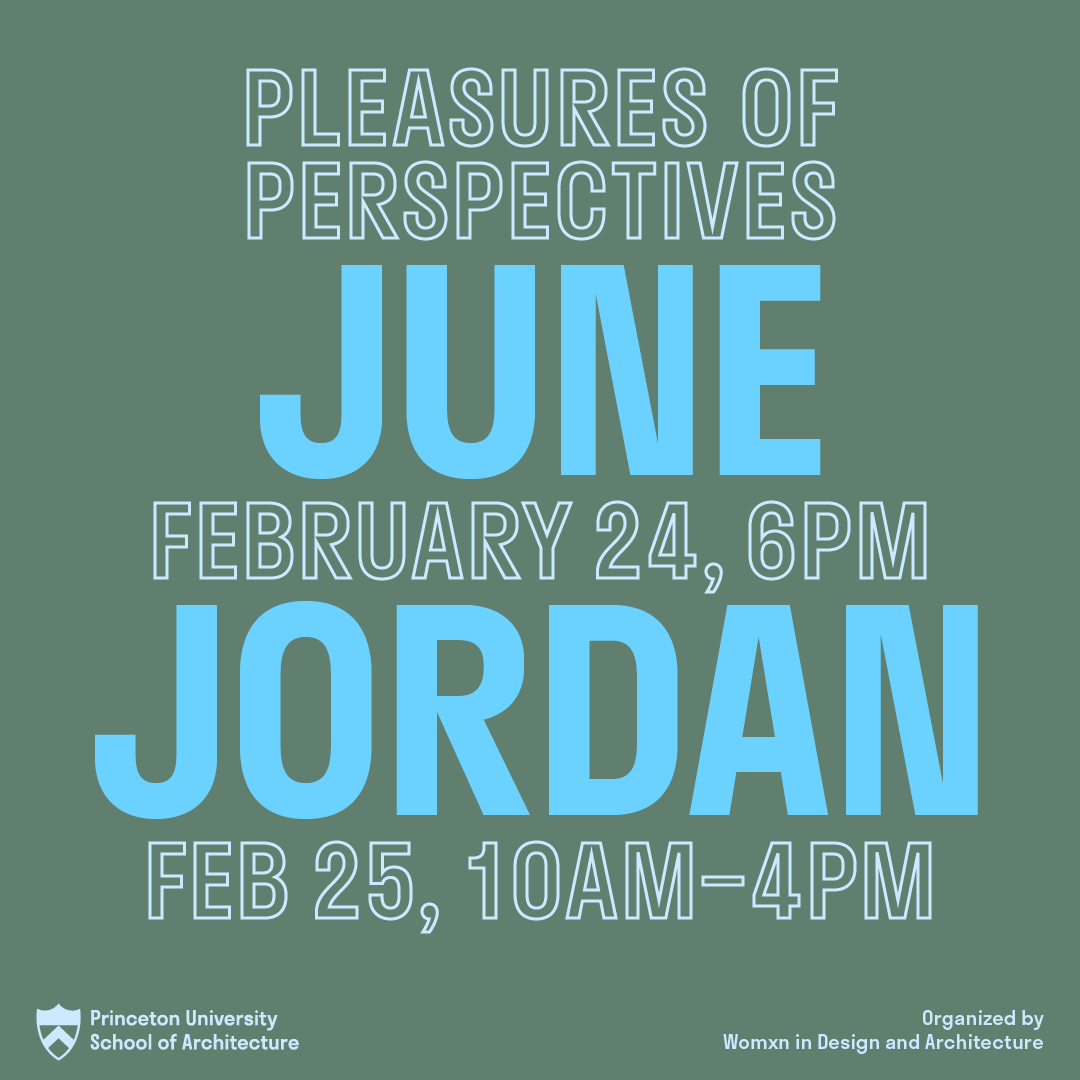February 24, 2022-February 25, 2022
June Jordan: Pleasures of Perspectives
June Jordan’s visionary practice reimagines the role of the built environment in creating just futures. Deeply committed to human rights and political activism, she used language to design a model for pedagogy and activism centered on ecology, care, and justice. While Jordan’s literary contributions reflect her work as a poet, author, teacher, and activist, what does it mean to call June Jordan an architect?1
Architecture is a form of storytelling. Using words as a medium, Jordan proposed designs ranging from the townhouse-scale interventions in her book, His Own Where, to the urban-scale, collaborative vision of “Skyrise for Harlem.” In 1970, she was awarded the Rome Fellowship Prize in Environmental Design. At all scales, Jordan’s work invites us to challenge and redefine prevailing socio-spatial constructs towards dignified spaces for all communities.
The sixth Womxn in Design and Architecture (WDA) conference at the Princeton School of Architecture (SoA) honors the life and work of June Jordan, Jamaican-American activist and feminist. Her expansive practice and inventive pedagogy continues to illuminate the intersectional influences of race, gender, sexuality, and ecology on the built environment. Building on the recent scholarship of Jordan’s visual and literary imagination, the conference asks: how does the work of June Jordan pave the way for the future of architectural practice and pedagogy?
2022 WDA Conference Organizers include Sophia Diodati, Keren Dillard, Laura Fegely, Ellen Harris, Patty Hazle, Rinna Jiang, Jacqueline Mix, Lisa Ramsburg, Adrian Silva, Eunice Slanwa, Shoshana Torn, Priscilla Zhang.
Additional 2021-2022 WDA Members include Jocelyn Beausire, Jarincy Rodriguez, Sofia Rojo, Marie de Testa.
The WDA Conference is made possible by the Jean Labatut Memorial Lecture Fund. WDA is a recognized student organization by The Graduate School of Princeton University. The School of Architecture, Princeton University, is registered with the AIA Continuing Education System (AIA/CES) and is committed to developing quality learning activities in accordance with the AIA/CES criteria.
RELATED PRESS
New York Review of Architecture Issue #27 features June Jordan: Pleasures of Perspectives. 3/30/22.
“June Jordan was an Architect” NYRA’s War and Architecture Skyline dispatch featured our 2022 WDA conference. 3/04/2022.
1 “June Jordan and a Black Feminist Poetics of Architecture” Alexis Pauline Gumbs; “Place, Emotion, and Environmental Justice in Harlem: June Jordan and Buckminster Fuller’s 1965 ‘Architextual’ Collaboration” Cheryl J. Fish
Rebecca Choi
Rebecca Choi is an architectural historian who interrogates questions of architectural agency, power, and labor practices through Black material production. Her work charts the racialization of politics, culture and representation as they cut through architectural form and urban spaces. Her book project Black Architectures examines architecture’s relationship to the changing landscape of American race relations between 1940—1970, paying particular attention to how social movements from Civil Rights to Black Power and the particular elements that help define those movements—anti-racist protests, boycotts, sit-ins and insurrections—impacted the field of architecture. Rebecca’s current work includes studying swamps as a site of Black resistance and Power, and a collaborative writing project that considers the architectural production of the African diaspora in and of the United States.
Nijah Cunningham
Nijah Cunningham is an assistant professor of English at Hunter College, CUNY. His teaching and research focus on African American and African diaspora literatures and culture. Through a transnational approach to black literary studies and critical archival practice, he considers Pan-Africanism and black internationalism within the domain of practice where the cultural-politics of the African diaspora is inextricably linked to questions of life and death, and bound up with social forces that converge within the everyday. In addition to his current book project, “Quiet Dawn,” his writing has appeared in platforms such as Small Axe, the New Inquiry, Women and Performance, ASAP/J, and PMLA. He is the curator of Hold: A Meditation on Black Aesthetics (Princeton University Art Museum, 2018) and, alongside David Scott and Erica M. James, co-curator of Caribbean Queer Visualities (The Small Axe Project, 2016), and The Visual Life of Social Affliction (The Small Axe Project, 2019-2020).
Charles L. Davis II
Charles L. Davis II is an associate professor of architectural history and criticism at the University at Buffalo. He received his PhD in architecture from the University of Pennsylvania and has an M.Arch and B.P.S. from the University at Buffalo. His academic research excavates the role of racial identity and race thinking in architectural history and contemporary design culture. His current book project, tentatively entitled “Black By Design: An Interdisciplinary History of Making in Modern America” recovers the overlooked contributions of black artists and architects in shaping the built environment from the Harlem Renaissance to Black Lives Matter. He has published articles and essays in Architectural Research Quarterly, Journal of the Society of Architectural Historians, Harvard Design Magazine, Log, Aggregate, Append-x and VIA.
Charles is co-editor of the cultural reader Diversity and Design: Understanding Hidden Consequences (Routledge, 2015) and the forthcoming Race and Modern Architecture (University of Pittsburgh, 2020), which collects 18 case studies on the racial discourses of modern architecture from the Enlightenment to the present. His book manuscript, Building Character: The Racial Politics of Modern Architectural Style (University of Pittsburgh, 2019) traces the historical integrations of race and style theory in paradigms of “architectural organicism,” or movements that modeled design on the generative principles of nature. This research has been supported by grants from the Canadian Center for Architecture, the Graham Foundation for Advanced Studies in the Fine Arts, the University of Pennsylvania and the University of North Carolina at Chapel Hill.
Erica R. Edwards
Erica R. Edwards is Associate Professor of English and Presidential Term Chair in African American Literature at Rutgers University. An expert in African American literature, politics, and feminist studies, she is the author of Charisma and the Fictions of Black Leadership (2012). Her 2021 book, The Other Side of Terror: Black Women and the Culture of US Empire, was published by NYU Press. Edwards is the co-editor, with Roderick Ferguson and Jeffrey Ogbar, of Keywords for African American Studies (NYU Press, 2018). Her work has appeared in journals such as differences, Callaloo, American Quarterly, American Literary History, and Post45.
Cheryl J. Fish
Cheryl J. Fish is an environmental justice scholar, poet and fiction writer.
In 2009, she published her groundbreaking essay on June Jordan and Buckminster Fuller’s 1965 collaboration on “Skyrise for Harlem” in the journal DISCOURSE; Since then she has written on teaching environmental justice and on resistance to extractivism by indigenous Sami artists and filmmakers in the Nordic countries in various journals and anthologies. Her most recent collections of poems and photos are THE SAUNA IS FULL OF MAIDS, celebrating Finnish sauna culture, friendship, and myth and CRATER & TOWER, poems examining the eruption of Mount St. Helens volcano through the lens of the terrorist attack of 9/11/01. Her poems have appeared in Poetics-for-the-More-than-Human-World, New American Writing, Hanging Loose, Terrain.org and elsewhere. Her debut novel OFF THE YOGA MAT is forthcoming from Livingston Press/UWA in Oct. 2022. Fish is the author of the study Black and White Women’s Travel Narratives, and co-editor with Farah Griffin, of A Stranger in the Village: Two Centuries of African American Travel Writing. She has been a Fulbright professor in Finland, has lectured in Germany, France and Sweden. She is professor of English at Borough of Manhattan Community College, City University of New York, and docent lecturer in the Department of Cultures at University of Helsinki.
Sophie Hochhäusl
Sophie Hochhäusl is an Assistant Professor for Architectural History and Theory at the University of Pennsylvania and an affiliated faculty member in the program in Gender, Sexuality, and Women’s Studies. Before joining the Weitzman School of Design she was the Frieda L. Miller Fellow at the Radcliffe Institute for Advanced Study at Harvard University.
Hochhäusl is interested in discourse on collectivity, dissent, and difference in architecture. Her scholarly work centers on modern architecture and urban culture in Austria, Germany, and the United States with a focus on spatial histories of dissidence and resistance art, labor theory and environmental history, as well as intersectional feminism and gender studies. At Princeton, Sophie is working on two book projects: the interdisciplinary history and translation project Memories of the Resistance: Margarete Schütte-Lihotzky and the Architecture of Collective Dissidence, 1918–1989 and the monograph Housing Cooperative: Politics and Architecture in Vienna, 1904–1934.
Hochhäusl holds an M.Arch. from the Academy of Fine Arts Vienna and an M.A. and Ph.D. from Cornell University in History of Architecture and Urbanism. Sophie’s fellowship is made possible by the Andrew W. Mellon Foundation.
Davy Knittle
Davy Knittle (he/they) is HMEI/Princeton Mellon Fellow in Architecture, Urbanism & the Environment. He received his Ph.D. in English from the University of Pennsylvania in 2021. He is at work on a book project entitled “The Climate of AIDS: Environment, Loss, and Resistance after Urban Renewal,” which uses a queer and trans literary archive to demonstrate the relationship between urban, environmental, and queer and trans loss in New York City since 1950 and to use this history to suggest new approaches to environmental justice. His critical work has appeared recently or is forthcoming in WSQ: Women’s Studies Quarterly, ISLE: Interdisciplinary Studies in Literature and Environment, GLQ: A Journal of Lesbian and Gay Studies, and Planning Perspectives. From 2016-2021, he curated the City Planning Poetics talk and reading series at the Kelly Writers House at the University of Pennsylvania.
Alexis Pauline Gumbs
Alexis Pauline Gumbs is a Queer Black Troublemaker and Black Feminist Love Evangelist and an aspirational cousin to all sentient beings. Her work in this lifetime is to facilitate infinite, unstoppable ancestral love in practice. Her poetic works in response to the needs of her cherished communities have held space for multitudes in mourning and movement. Gumb’s coedited volume of Revolutionary Mothering: Love on the Front Lines (PM Press, 2016) has shifted the conversation on mothering, parenting, and queer transformation. She has transformed the scope of intellectual, creative, and oracular writing with her triptych of experimental works published by Duke University Press (Spill: Scenes of Black Feminist Fugitivity in 2016, M Archive: After the End of the World in 2018, and Dub: Finding Ceremony in 2020.) Unlike most academic texts, Alexis’s work has inspired artists across form to create dance works, installation work, paintings, processionals, divination practices, operas, quilts and more.
From 2017 to 2019, Gumbs served as visiting Winton Chair at University of Minnesota where she collaborated with Black feminist artists in the legacy of Laurie Carlos to create collaborative performances based on her books Spill and M Archive. During that time she served as dramaturg for the award winning world premiere of Sharon Bridgforth’s Dat Black Mermaid Man Lady, directed by Ebony Noelle Golden. Her book Undrowned: Black Feminist Lessons from Marine Mammals is forthcoming from AK Press in Fall 2020. She is currently at work on multiple manuscripts including: The Eternal Life of Audre Lorde: Biography as Ceremony and Go There, an engagement with the archive of Black feminist transnational practice spearheaded by Cheryll Y. Greene and Alexis De Veaux at Essence Magazine from the 1970s to 1990s.
V. Mitch McEwen
V. Mitch McEwen is an architectural designer, urban designer, and principal of Atelier Office. McEwen’s design work has been commissioned by the Museum of Modern Art and the Venice Architecture Biennale US Pavilion, and has been awarded grants from the Graham Foundation, Knight Foundation, and New York State Council on the Arts. McEwen also teaches at Princeton School of Architecture, where she directs the architecture and technology research group Black Box, exploring mixed human-robotic processes in design and construction. She is one of ten co-founders of the Black Reconstruction Collective.
Conor Tomás Reed
Conor Tomás Reed is a Puerto Rican/Irish gender-fluid scholar-organizer who teaches American Studies at Brooklyn College. Conor is a contributing editor with LÁPIZ Journal and Lost & Found: The CUNY Poetics Document Initiative, and a co-founding participant in Free CUNY and Rank and File Action (RAFA). Conor is completing a book, New York Liberation School (Common Notions, Fall 2022), about the rise of Black, Puerto Rican, and Women’s Studies and movements at the City College of New York and in New York City, as well as co-editing the quadrilingual anthology Black Feminist Studies in the Americas and the Caribbean.
Sapphire
Sapphire is the author of two bestselling novels, Push and The Kid. Push was made into the Academy Award-winning major motion film Precious, and the film adaptation received the Academy Award for Best Screenplay and Best Supporting Actress. Sapphire is also the author of two collections of poetry: American Dreams, cited by Publishers Weekly as, “One of the strongest debut collections of the nineties;” and Black Wings & Blind Angels, of which Poets & Writers declared, “With her soul on the line in each verse, her latest collection retains Sapphire’s incendiary power to win hearts and singe minds.” Library Journal calls Sapphire’s poetry “spiky and uncompromising” and describes her as a “poet of slick-talking, nearly hallucinatory riffs on growing up poor, tough, and black in America.” Sapphire’s work has been translated into thirteen languages and has been adapted for stage in the United States and Europe. Her poetry, fiction, and essays have appeared in The Black Scholar, The New York Times Magazine, The New York Times Book Review, The Teacher’s Voice, The New Yorker, Spin, and Bomb. Sapphire’s presentation, poetry, novels, and the film Precious, all speak to issues of overcoming adversity and empowerment.
Talia Shalev
Talia Shalev is a scholar, teacher, and poet. With the support of an ACLS fellowship, she is currently developing a book manuscript titled Some Inarticulate Major Premise: Poetry, the Will of the People, and the U.S. Supreme Court. Talia is a co-editor of two collections of poets’ archival materials: June Jordan’s “Life Studies,” 1966-1976 and Adrienne Rich: Teaching at CUNY, 1968-1974, both published through Lost & Found: the CUNY Poetics Document Initiative. Her writing appears in The Seattle Review, The Volta, Cream City Review, and Women’s Studies: an inter-disciplinary journal.
Mecca Jamilah Sullivan
Mecca Jamilah Sullivan is the author of Big Girl and Blue Talk and Love, winner of the Judith A. Markowitz Award from Lambda Literary. Sullivan is an associate professor of English at Georgetown University. A native of Harlem, she lives in Philadelphia, PA.
Brandi T. Summers
Brandi T. Summers, PhD is assistant professor of Geography at UC Berkeley, and is founding co-director of the Berkeley Lab for Speculative Urbanisms. Her research examines the relationship between and function of race, space, urban infrastructure, and architecture. Her book, Black in Place: The Spatial Aesthetics of Race in a Post-Chocolate City (UNC Press, 2019), explores how competing notions of blackness structure efforts to structure economic relations and develop land in gentrifying Washington DC. Her current book project explores the roots and routes of Black resistance that laid a foundation for the current affective economies organized to reclaim space through public cultures, politics, and the aesthetics of Black life in her hometown, Oakland, California. Dr. Summers has published several articles and essays that analyze the relationship between race, power, aesthetics, and urbanization that appear in both scholarly and popular publications, including The New York Times, The Boston Globe, Places Journal, and Antipode.
Ife Salema Vanable
Ife Salema Vanable is an architect, theorist, and historian who holds professional and post-professional degrees in architecture from Cornell and Princeton Universities. Ife is founder and leader of i/van/able, a Bronx-based architectural workshop and think tank and a PhD candidate in architectural history and theory at Columbia University’s Graduate School of Architecture Planning and Preservation (GSAPP). She is the inaugural KPF Visiting Scholar at the Yale School of Architecture where she taught the graduate seminar Tall Tales based on her current dissertation project. Her scholarly work asks questions of and seeks to unearth complex and seemingly banal relationships between the design of multi-family housing, municipal government machinations for its development, conceptions of racial difference, geography, finance, program, and family composition. This work specifically engages histories of the private development of low-moderate income housing in the form of high-rise residential towers in 1970s New York under the program known as Mitchell-Lama. In this context Ife studies modes of black subjectivity and dwelling in tall buildings, the performance of domesticity and respectability, and the politics, aesthetics, and materiality of the making of home.
Yolanda Wisher
Philadelphia-based poet, singer, educator, and curator Yolanda Wisher is author of Monk Eats an Afro and co-editor of the anthology Peace is a Haiku Song with mentor Sonia Sanchez. Wisher was named inaugural Poet Laureate of Montgomery County, Pennsylvania in 1999 and third Poet Laureate of Philadelphia for 2016 and 2017. Her work has been featured in The New York Times, The Philadelphia Inquirer, and Poem-a-Day and has been commissioned by the Institute for Contemporary Art, HealthSpark, the Statue of Peace Plaza Committee, CBC Radio, and Philadelphia Jazz Project. A Pew and Cave Canem Fellow, Wisher received the Leeway Foundation’s Transformation Award in 2019 for her commitment to art for social change. She taught high school English for a decade, co-founded the youth-led Germantown Poetry Festival, and served as Director of Art Education for Philadelphia Mural Arts. Wisher teaches poetry workshops for all ages in a variety of settings. She is the founder of the School of Guerrilla Poetics, a training ground for folks interested in nurturing and mobilizing communities through poetry. Wisher earned an M.A. in English/Poetry from Temple University and B.A. in English/Black Studies from Lafayette College, where she received an honorary doctorate of letters in 2021. She has curated projects with the Rosenbach, Philadelphia Museum of Art, Free Library of Philadelphia, and U.S. Department of Arts & Culture. She was in the first cohort of artists with studios at Cherry Street Pier on the Delaware River Waterfront. As Curator of Spoken Word and Co-Director of Curatorial Programs at Philadelphia Contemporary, Wisher has produced programs like Stellar Masses, a series of poetry church services, and Love Jawns: A Mixtape, a collection of spoken word-infused soundscapes. She performs a blend of poetry and song with her band Yolanda Wisher & The Afroeaters. Doublehanded Suite, their debut album, will be out in 2022.
Thursday
February 24th
Yolanda Wisher, poet, singer, educator, and curator
Sapphire, author and performance poet
Friday
February 25th
Ife Salema Vanable, architect, historian, and theorist, i/van/able
Mecca Jamilah Sullivan, author and artist; Associate Professor of English, Georgetown University
Davy Knittle, HMEI/Princeton Mellon Fellow in Architecture, Urbanism & the Environment
Brandi T. Summers, Assistant Professor of Geography and Global Metropolitan Studies, University of California, Berkeley
Rebecca Choi, architectural historian; Postdoctoral Fellow, ETHZürich; Visiting Lecturer, gta Institute
[Click here for Davy Knittle talk]
V. Mitch McEwen, architect; co-founder of Atelier Office; Assistant Professor, Princeton University School of Architecture
Sophie Hochhäusl, Assistant Professor for Architectural History and Theory, Stuart Weitzman School of Design, University of Pennsylvania
Erica R. Edwards, author; Associate Professor of English and Presidential Term Chair in African American Literature, Rutgers University
